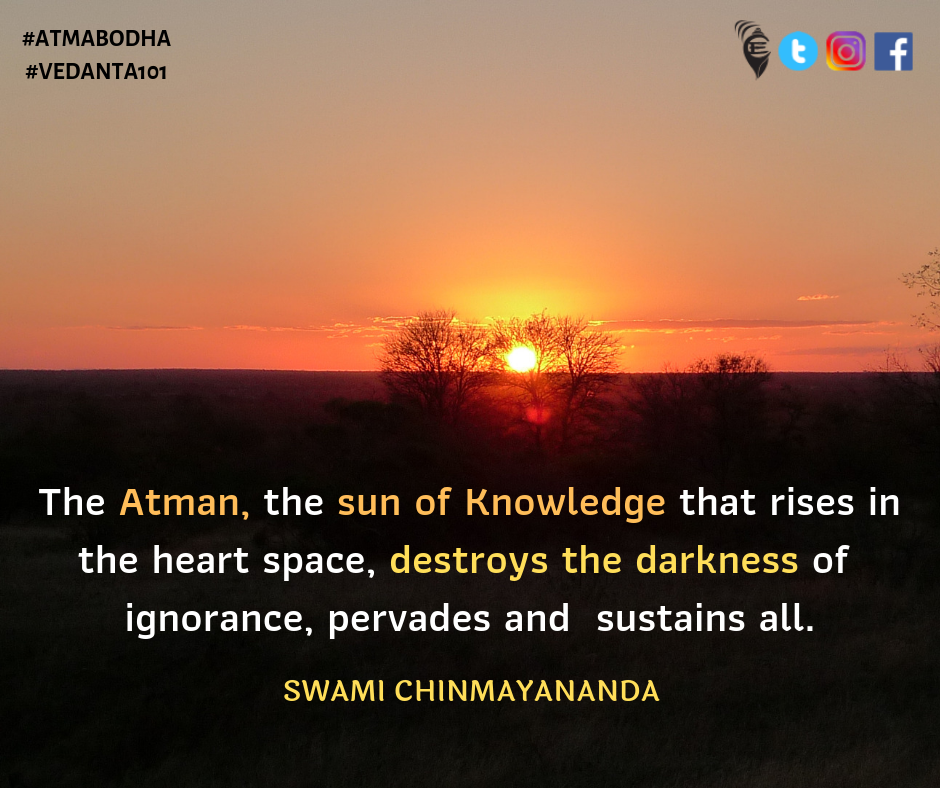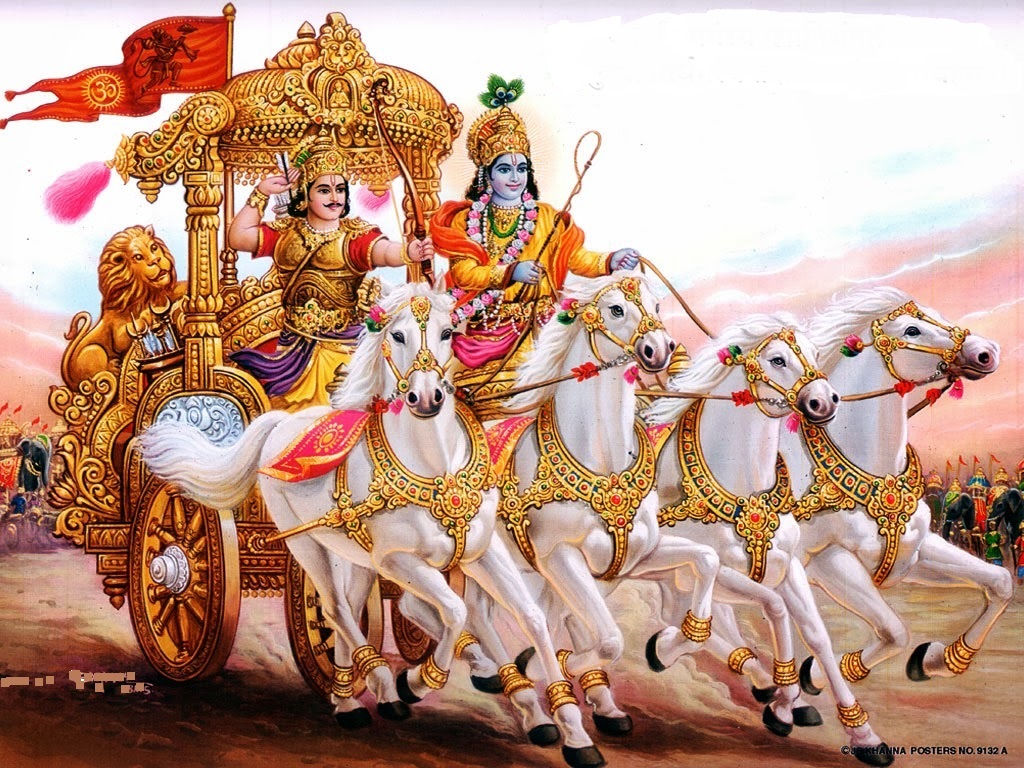Srimad Bhagavad Gita : 3. Swami Sivananda
---------------------------------------------------------
Tuesday, October 20, 2020. 08 : 27. AM.
3. Sri Gita Dhyana : FIRST DISCOURSE : THE YOGA OF THE DESPONDENCY OF ARJUNA
-------------------------------------------------------------
Om Sri Sat-guru Paramatmane Namah
THE BHAGAVAD GITA
FIRST DISCOURSE
THE YOGA OF THE DESPONDENCY OF ARJUNA
-------------------------------------------------
Dhritarashtra said:
1. What did my people and the sons of Pandu do when they had assembled together eager for battle on the holy plain of Kurukshetra, O Sanjaya?
Sanjaya said:
2. Having seen the army of the Pandavas drawn up in battle-array, king Duryodhana then approached his teacher (Drona) and spoke these words.
3. "Behold, O Teacher! this mighty army of the sons of Pandu, arrayed by the son of Drupada, thy wise disciple.
4. "Here are heroes, mighty archers, equal in battle to Bhima and Arjuna, Yuyudhana (Satyaki), Virata and Drupada, of the great car (mighty warriors).
5. "Dhrishtaketu, Chekitana and the valiant king of Kasi, Purujit and Kuntibhoja and Saibya, the best of men.
6. "The strong Yudhamanyu and the brave Uttamaujas, the son of Subhadra (Abhimanyu, the son of Subhadra and Arjuna), and the sons of Draupadi, all of great chariots (great heroes).
7. "Know also, O best among the twice-born! the names of those who are the most distinguished amongst ourselves, the leaders of my army; these I name to thee for thy information.
8. "Thyself and Bhishma, and Karna and also Kripa, the victorious in war, Asvatthama, Vikarna, and also Jayadratha, the son of Somadatta.
9. "And also many other heroes who are ready to give up their lives for my sake, armed with various weapons and missiles, all well-skilled in battle.
10. "This army of ours marshalled by Bhishma is insufficient, whereas that army of theirs marshalled by Bhima is sufficient.
11. "Therefore, do ye all, stationed in your respective positions, in the several divisions of the army, protect Bhishma alone."
12. His glorious grandsire (Bhishma), the oldest of the Kauravas, in order to cheer Duryodhana, now roared like a lion, and blew his conch.
13. Then (following Bhishma), conches and kettledrums, tabors, drums and cow-horns blared forth quite suddenly (from the Kaurava side) and the sound was tremendous.
14. Then, also, Madhava (Krishna) and the son of Pandu (Arjuna), seated in the magnificent chariot, yoked with white horses, blew their divine conches.
15. Hrishikesa blew the Panchajanya and Arjuna blew the Devadatta and Bhima (the wolf-bellied), the doer of terrible deeds, blew the great conch Paundra.
16. The king Yudhishthira, the son of Kunti, blew the Anantavijaya; Nakula and Sahadeva blew the Sughosha and the Manipushpaka.
17. The king of Kasi, an excellent archer, Sikhandi, the mighty car-warrior, Drishtadyumna and Virata and Satyaki, the unconquered.
18. Drupada and the sons of Draupadi, O Lord of the earth, and the son of Subhadra, the mighty-armed, blew their conches separately.
19. That tumultuous sound rent the hearts of (the members of) Dhritarashtra’s party, making both the heaven and the earth resound.
20. Then, seeing the people of Dhritarashtra’s party standing arrayed and the discharge of weapons about to begin, Arjuna, the son of Pandu, whose ensign was a monkey, took up his bow and said the following to Krishna, O Lord of the earth.
Arjuna said:
21, 22. In the middle between the two armies, place my chariot, O Krishna, so that I may behold those who stand here desirous, to fight, and know with whom I must fight, when the battle is about to commence.
23. Fr I desire to observe those who are assembled here to fight, wishing to please in battle the evil-minded Duryodhana (the son of Dhritarashtra).
Sanjaya said:
24. Thus addressed by Arjuna, Krishna, having stationed that best of chariots, O Dhritarashtra, in the midst of the two armies;
25. In front of Bhishma and Drona, and all the rulers of the earth, said: "O Arjuna (son of Pritha), behold these Kurus gathered together."
26. Then, Arjuna (son of Pritha) saw there (in the armies) stationed, fathers and grandfathers, teachers, maternal uncles, brothers, sons, grandsons and friends too.
27. (He saw) fathers-in-law and friends also in both the armies. The son of Kunti, Arjuna, seeing all those kinsmen thus standing arrayed, spoke this, sorrowfully, filled with deep pity.
Arjuna said:
28. Seeing these my kinsmen, O Krishna, arrayed, eager to fight,
29. My limbs fail and my mouth is parched, my body quivers and my hair stands on end.
30. The (bow) Gandiva slips from my hand, and also my skin bums all over; I am unable even to stand and my mind is reeling as it were.
31. And I see adverse omens, O Kesava. I do not see any good in killing my kinsmen in battle.
32. I desire not victory O Krishna, nor kingdom, nor pleasures. Of what avail is dominion to us, O Krishna, or pleasures or even life?
33. Those for whose sake we desire kingdom, enjoyments and pleasures, stand here embattled, having renounced life and wealth.
34. Teachers, fathers, sons and also grandfathers, maternal uncles, fathers-in-law, grandsons, brothers-in-law and other relatives,
35. These I do not wish to kill, though they kill me, O Krishna, even for the sake of dominion over the three worlds; leave alone killing them for the sake of the earth.
36. By killing these sons of Dhritarashtra, what pleasure can be ours, O Janardana? Only sin will accrue to us from killing these felons.
37. Therefore, we should not kill the sons of Dhritarashtra, our relatives; for how can we be happy by killing our own people, O Madhava (Krishna)?
38. Though they, with intelligence overpowered by greed, see no evil in the destruction of families, and no sin in hostility to friends,
39. Why should not we who clearly see evil in the destruction of families, learn to turn away from this sin, O Janardana (Krishna)?
40. In the destruction of a family, the immemorial religious rites of that family perish; on the destruction of spirituality, impiety, indeed, overcomes the whole family.
41. By the prevalence of impiety, O Krishna, the women of the family become corrupt; and, women being corrupted, O Varshneya (descendent of Vrishni), there arises intermingling of castes.
42. Confusion of castes leads to hell the slayers of the family, for their forefathers fall, deprived of the offerings of rice-ball and water (libations).
43. By these evil deeds of the destroyers of the family, which cause confusion of castes, the eternal religious rites of the caste and the family are destroyed.
44. We have heard, O Janardana, that inevitable is the dwelling for an unknown period in hell for those men in whose families the religious practices have been destroyed.
45. Alas! We are involved in a great sin, in that we are prepared to kill our kinsmen, through greed for the pleasures of a kingdom.
46. If the sons of Dhritarashtra with weapons in hand should slay me in battle, unresisting and unarmed, that would be better for me.
Sanjaya said:
47. Having thus spoken in the midst of the battlefield, Arjuna, casting away his bow and arrow, sat down on the seat of the chariot with his mind overwhelmed with sorrow.
Thus in the Upanishads of the glorious Bhagavad-Gita, the science of the Eternal, the scripture of Yoga, the dialogue between Sri Krishna and Arjuna, ends the first discourse entitled:
-----------------------------------
To be continued ...
=============================================================





Comments